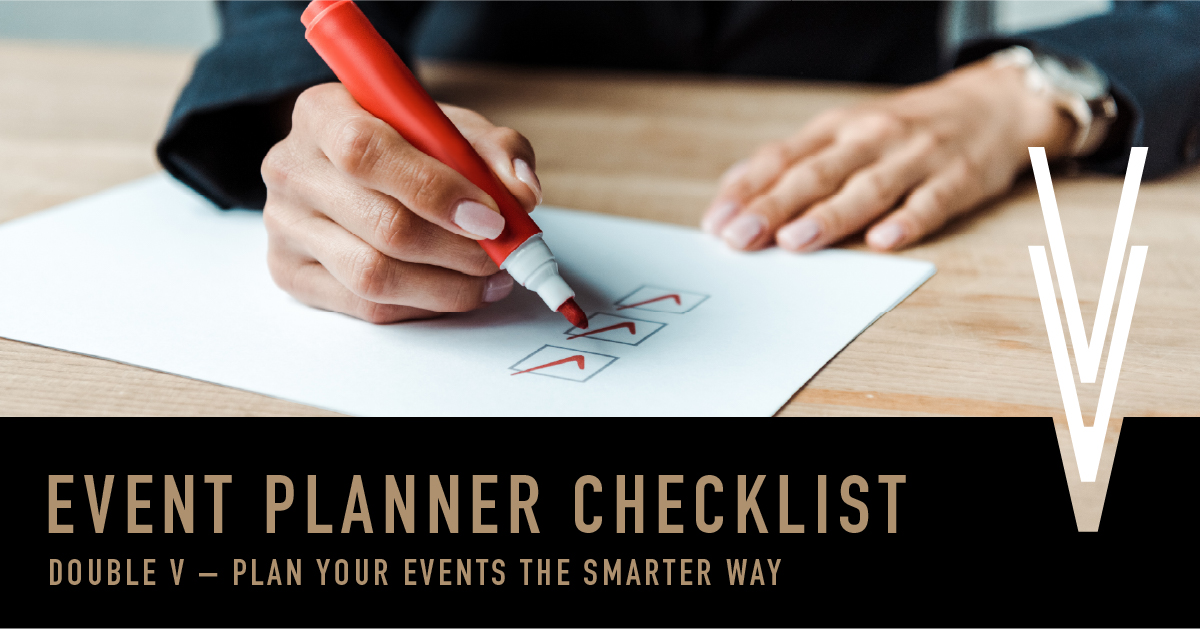Event Planning Checklist



The Ultimate Corporate Event Planning Checklist:
The Ultimate Corporate
Event Planner Checklist:
DOUBLE V – Plan your event a smarter way
DOUBLE V – Plan your events
the smarter way

Organizing a corporate event can be a complex and daunting task, but with the right planning and preparation, it can also be a great success. Whether you’re planning a conference, a product launch, or a company celebration, having a corporate event planner checklist can help ensure that your event runs smoothly and is remembered for all the right reasons. DOUBLE V have the smarter way checklist. This comprehensive checklist was created with one goal in mind: to make corporate event planning easier and more efficient. This checklist includes everything from making sure you have all necessary permits and licenses, to budgeting and creating timelines.
Here’s a comprehensive guide to help you plan your next corporate event:
Introduction to Corporate Event Planning
Introduction
to Corporate Event Planning
Corporate events are an important tool for companies to engage with their employees, clients, and other stakeholders. These events are designed to showcase a company’s brand, products, and services and can range from small, intimate gatherings to large-scale events with hundreds of attendees.
The success of a corporate event is often measured by its impact on the audience and the company’s bottom line. A well-planned event can help a company build its brand, increase employee morale, and create new business opportunities.
Before you start planning your event, it’s important to define what you want to achieve with it. Do you want to show case your products, increase brand awareness, or build relationships with clients? Once you have a clear understanding of your objectives, you can use them to guide your planning and make informed decisions about the type of event you want to host.
One of the most important steps in planning a corporate event is determining your budget and timeline. Your budget will impact the type of event you can host and the services you can afford, so it’s essential to have a clear understanding of what you can spend. Your timeline will also impact the planning process and help you prioritize tasks to ensure that your event runs smoothly.
The venue and date of your event are two of the most critical components to consider. When choosing a venue, consider the size, location, and availability of the space, as well as the type of event you’re hosting. The date of your event will also impact the availability of the venue, so it’s important to choose a date that works for both you and your guests.
Developing a theme and concept for your event can help create a cohesive and memorable experience for your guests. Your theme and concept should align with your event objectives and reflect your company’s brand and values.
Once you have a clear understanding of your objectives, budget, timeline, venue, and concept, it’s time to create an invitation list and send out invitations. Your invitation list should include all the people you want to attend your event, and your invitations should clearly communicate the purpose, date, and location of the event.
The program and schedule of your event are critical components to consider, as they will help ensure that your guests have a memorable and enjoyable experience. When planning your program, consider the type of event you’re hosting, your objectives, and the interests of your guests. Your schedule should include time for networking, presentations, and other activities that will engage your guests and help you achieve your objectives.
The logistics and services required for your event will vary depending on the type of event you’re hosting, but they will include things like catering, audio-visual equipment, transportation, and signage. Coordinating these services will ensure that everything runs smoothly on the day of the event and that your guests have a positive experience.
Marketing and promotions play a key role in the success of your corporate event. From promoting the event to your target audience to creating buzz and excitement, a well-planned marketing and promotion strategy can help ensure that your event is well-attended and remembered.
Consider the different channels you can use to promote your event, such as email, social media, and traditional marketing methods like print advertising. Make sure to include all relevant information about the event, including the date, time, location, and any special features or activities.
Planning a corporate event can be a complex and time-consuming task, so it’s important to assign tasks and responsibilities to ensure that everything runs smoothly. Consider delegating tasks like catering, audio-visual equipment, and transportation to experienced professionals, and assign team members to lead different aspects of the event.
Following up after the event is an important step in the planning process. Evaluate the success of the event and collect feedback from attendees, and use this information to make improvements for future events. This can include things like making changes to the program or schedule, improving marketing and promotion efforts, or considering different venues or activities.

500-20,000+
Guests Per Event
FAQs About Corporate Event Planning
FAQs About Corporate
Event Planning
A: When choosing a venue for your corporate event, consider the size and availability of the space, its location, and the type of event you’re hosting. It’s also important to consider your budget and timeline, as these will impact the availability of the venue and the services you can afford.
A: There are many different channels you can use to promote your corporate event, including email, social media, and traditional marketing methods like print advertising. Make sure to include all relevant information about the event, such as the date, time, location, and any special features or activities.
A: To ensure the success of your corporate event, it’s important to have a clear understanding of your objectives, budget, and timeline, and to choose a venue, date, and concept that aligns with these. It’s also important to have a well-planned program and schedule, coordinate logistics and services, and follow up after the event to make improvements for future events.